Peter Illyn is executive director of Restoring Eden, a nonprofit working to make environmental stewardship a core Christian value.

Monday, 10 Mar 2003
HAINES, Alaska
I’m a Christian environmental evangelist!
This definition is loaded with stereotypes, both positive and negative, but it best describes what I do — traveling around the country preaching in churches and colleges about the goodness of nature and our sacred duty to love, serve, and protect God’s creation.
My message is simple: “God is a good God, God made a good earth, God calls us to be good stewards.” I use the Bible to encourage Bible-believing Christians to become strong and vocal environmentalists.
And it’s working.
It’s early Monday morning and I’m cold, colder than I’ve been in a long time. It’s a frozen 13 degrees here in Haines, Alaska, with the wind blowing through the cracks of the 100-year-old army hospital where I am staying. I’m here with 11 college students from Palm Beach Atlantic, a university in West Palm Beach, Florida, with historic Baptist roots.
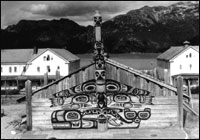
Tlingit totem art.
The students are here in southeast Alaska to restore Tlingit (“klink-it”) totem poles. Starting this morning, we will scrape weathered totem poles to protect them for future generations. Our goal is to honor the Tlingit culture and to learn about their traditional deep respect for the land.
We are working with the Alaskan Indian Arts Center, which for 50 years has been striving to preserve and pass on the traditional Tlingit arts before they are lost forever. Early Christian missionaries, uninformed and ignorant about the Tlingit people, worked to end what they thought was a “heathen” culture. Totems, long houses, masks, and blankets were stolen or destroyed.
But these college students, in a small way, want to apologize for the spiritual arrogance of the earlier missionaries. They are part of a growing movement on college campuses to use alternative spring breaks as an opportunity to serve communities instead of partying on the beach.
But the students are also here to be inspired by the wonder, the wisdom, and the whimsy of God as revealed in nature. They are being touched by the Divine as they watch the bald eagles soar above the tree lines, or see the Alpine-glow sunset on snow-covered peaks, or wait for the migrating whales to break through the turbulent sea. Some of the students have never seen snow before — but before you laugh, how many of you have watched a manatee graze on the sea grass in south Florida?

Restoring Eden is a new nonprofit group working to make environmental stewardship a core value of the Christian community. Our mission is defined by Proverb 31:8, which says we are to “speak out for those who cannot speak for themselves.” For us, this means we promote the right of wild species, native habitats, and indigenous cultures to thrive in a wild, natural world.
These students, the focus of Restoring Eden’s outreach efforts, represent the next generation of Christians. They are youthful, holistic, humble, and willing to see a connection to nature that many of their church elders will never understand. More importantly, they are willing to integrate their faith and their love of the creation into visible advocacy. For them, this translates into both lifestyle changes and political activism.
In fact, last week over 20 college students from seven Christian colleges came to Washington, D.C., to stand with the Gwich’in tribal Christians of Alaska in an effort to protect the Arctic Refuge from oil drilling. These students see the immorality of destroying a miraculous place in nature just to keep feeding our nation’s insatiable addiction to oil. They see the hand of God in the migration of the caribou to the birthing grounds at the refuge and in the simple lives of the Gwich’in people who depend upon them.
I’ve been on the road traveling for almost five weeks now. My soul is road-weary and tired, but the energy I see on the college campuses is renewing and refreshing. This work is reaching a new generation of Christians and in time will change the entire institution of the church. I predict that in 10 years the evangelical church will look back with shame at their silence and inaction while watching the relentless destruction of the wild.
For too long we have allowed people to define the value of nature solely in economic and utilitarian terms. The church, while claiming to love the Creator, has not loved the creation. We have lost the ability to see the intrinsic value of nature — the beauty, solitude, peace, and humility in the world around us.
We have lost sight of the fact that we are simply a part of nature — not the point of nature.
But there is a growing group of Christians who see the hand of God in yearly migrations of geese flying south, or in millions of monarch butterflies landing in a forest grove in Mexico, or in the caribou herds walking steadfastly to their birthing grounds in the Arctic Refuge. Our souls need the wild.
Tuesday, 11 Mar 2003
HAINES, Alaska
Today I awoke to another cold day in southeast Alaska. I feel slightly repentant because last night the Northern Lights appeared, but it was too cold to enjoy the view. I lasted less than five minutes outdoors before I retreated back to my room to get warm. My need for comfort was greater than my willingness to be inspired by the shimmering light. An apt metaphor for our ecological condition: Personal comfort wins out over the appreciation of nature.
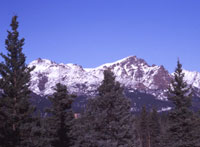
The mountainous view.
The students from Palm Beach Atlantic University began work on the totem poles yesterday, but the weather was so cold that they didn’t last long. They all brought the warmest clothes they could find in South Florida, many of them scouring the thrift stores for jackets, hats, and gloves. But 10 degrees is cold no matter what you wear. The cold front came with a positive payoff, however: The sky is crystal blue and the mountains crystal white. We’ll try again today.
I am preparing myself to host a community outreach in the town library tonight. I will become a traditional evangelical evangelist — come to town, lay down the Word of God, stir up some passion, and call the people to action! Called the “Theology of Wild,” my message takes a look at biblical Christianity and the stewardship of nature.
Haines has a population of 1,200. Small town Alaska is an intimidating place to try to build grassroots support for the environment. Many people blame environmentalists for the closure of the mills and the rise in unemployment. Here, we are labeled as radicals: anti-people, anti-job, and anti-American. To come into a small, rural, economically depressed town and try to build support for sustainable behavior is risky.
The anticipation is the worst part. I confess that I also worry that no one will show up. Sometimes I speak to a standing-room-only crowd, other times to an almost-empty room. Try as I will to not make the attendance numbers feel personal, they always do. I can feel my anxiety growing this morning.

A poster for the talk.
The newspaper had a small article announcing the event. Yesterday, I did a short interview on the radio. The local newspaper is scheduled to come by for a complete story. If I had more money, I would have run a small ad in the newspaper for two weeks prior to speaking. Some local volunteers have put posters up around town. I sent letters to all the churches, but pastors tend to be reluctant to spread the word about some unknown speaker talking about a controversial topic. That’s okay; one goal of the initial visit to any community is to begin building relationships.
The students have been wonderfully adaptive to the process of becoming environmentalists. They spent the past three months raising money for the trip through donations, rock concerts, and bake sales. Many admit that they came simply for the adventure of seeing Alaska. Only a few describe themselves as hardcore environmentalists, but they are all beginning to see the complex interrelationships between biological integrity, nature appreciation, sustainable local economies, social justice, and tribal cultures.
Every morning begins with a devotional where the students read and discuss a portion of a wonderful booklet called “Celebrating the Wonder of Creation,” written by Dean Ohlman of the Radio Bible Church, a conservative radio ministry that has “grasped the vision” of environmental stewardship.
During these devotionals, the students explore the historic Christian connections to creation care — our lingo for environmental stewardship. Early on, it became clear that many had never thought about the needs of wild ecosystems. They thought environmental stewardship consisted of recycling instead of littering. Most had never seen intact, pristine forests that were slated for logging. None had ever hugged a tree destined to die.
Last night, four members of the local conservation organization, Lynn Canal Conservation Group, came and spoke to the students, who were impressed by the speakers’ passion and commitment to preserving wild lands. The speakers admitted that most of their adversaries were conservative Christians.
Later, during our evening debriefing, the students discussed how many of the environmentalists they had met were avowed non-Christians and that most Christians were avowed anti-environmentalists. They discussed how our favorite bumper sticker (“If you love the Creator, take care of creation”) seems such a simple truth, but is seldom lived out in the world around us. The question became which had greater influence on our core value systems: Does our faith impact our social values? Or, do social values define our faith? We concluded that the answer was both — our faith should impact society and society definitely redefines our faith.
The students concluded that if we could learn to love, serve, and protect God’s creation, we will build up our faith and change life. This is my hope for the students. This is my hope for the Earth. This is my hope for my soul.
Wednesday, 12 Mar 2003
HAINES, Alaska
Last night’s outreach event was a success. About 50 people showed up at the Haines town library to talk about the “Theology of Wild.” Pastors from four churches also attended, so our circle of credibility has expanded. The students from Palm Beach Atlantic University led the mixed crowd in some songs, including “Jeremiah was a Bullfrog” which was a good icebreaker. Aging hippies and conservative Christians all sang together, led by a group of guitar- and mandolin-playing Christian youth from South Florida. A celebration of eclectic community building!
After my sermon, the students were flooded with offers to come over to peoples homes for dinner. That night, as we debriefed, the students discussed how impressed they were with the honest struggles people in Alaska face in trying to make a living while not destroying the ecosystems they depend on.
We are struggling, however, to find enough good volunteer work for the students. It took all of two hours to scrape the totem pole clean; 13 people can get a lot done quickly. We will stack some firewood for the native carvers and maybe work at the recycling center to help them, but there is more free time than I would like.
Today, I rented a tour bus and we are headed out into of the wilds of Alaska. Our plans are to first visit a bald eagle preserve, then cross over into Canada and go up over the high mountain pass. But the weather report says it will be 40 degrees below zero in the mountains, so our day of playing in the snow probably won’t happen. We will stop by the Klukwan tribal village for a brief visit and then head home for an evening of hot-tubing and star-gazing with some locals.
Now that my speaking responsibilities are over for a while, it is time to move on to the next projects in the pipeline. Restoring Eden is a small organization that was just begun last year. I have not added staff because our funding stream is still in its infancy and not too dependable. This means that I am doing most of the work myself — grant writing, fundraising, activist training, outreach, bookkeeping, etc. It can get exhausting, but I keep plugging away.
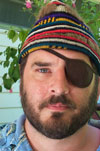
Post-op pirate fun.
I came down with eye cancer this past July and had my left eye surgically removed. The doctors think they got all the cancer, but my type — ocular melanoma — is a stealth cancer. It has a tendency to reappear in 10 years and then the outlook is grim, with only a 15 percent survival rate. I now live with the knowledge that I might die young, which can be very scary. The good news is that in reflecting upon my life, I am proud of the work I am doing and feel a great sense of vocation — of a calling and a purpose that is larger than simply a career.
I am trying to organize a conference on Celebrating the Wonder of Creation in Anchorage for this fall. Members of the Catholic, Orthodox, and Episcopal diocese have agreed to meet. On Sunday, I head up to try to lay the initial groundwork and discover what common interests we have and what obstacles we might face in an ecumenical outreach project. I need to gauge the level of controversy the church leaders are willing to tolerate, since environmental issues are very political in Alaska.
I was also disheartened by the news that the decision on drilling in the Arctic National Wildlife Refuge may come down to two votes — Sen. Gordon Smith (R-Ore.) and Sen. Norm Coleman (R-Minn.). Students from Christian colleges in both states have met with them and presented our side of the debate. Now is the time to turn up the heat, so I have to contact my student groups today to increase the pressure. I have a student leader at George Fox College in Oregon who is petitioning students on campus. I need to get the word to him that now is the time to deliver those petitions.
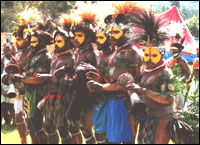
The Papua New Guinea highlander group.
Later today, I will email tribal leaders in Papua New Guinea to help them create a new Christian environmental group, Christians Advocating for the Stewardship of the Environment. The New Zealand and Australian governments have expressed interest in funding the group, as has an evangelical relief and development organization from New Zealand.
But the process of creating a functioning nonprofit from scratch is difficult for tribal communities. As tribal people, they have their own organizational pace and sense of tribal protocols, but they have to meet the outcome standards of Western funders. This week, a group of them are getting together to “story” which is their word for discussing the group vision. Papua New Guinea is one of three countries owned and governed by indigenous groups, but it is new for them to think nationally and to navigate in global, cash-based economies.
Well, I’ve put on my long underwear and need to go out into the frigid Alaskan morning.
Thursday, 13 Mar 2003
HAINES, Alaska
Yesterday, I crossed the Canadian border with 12 students from a Baptist college in Florida. It was 40 degrees below zero with wind chill, and I was amazed to watch some the students strip off their jackets and shirts to race bare-chested back to the tour bus. We had to stop at the “Welcome to Canada” sign and wait for five minutes as every person snapped a group photo.
We saw bald eagles and mountain goats as we toured the wilds of Alaska, and I felt like I was starting to meet my goal — to help the students understand the right of the wild to remain wild. For the first time, they really understand why “greenies” (as they are labeled in Alaska) work diligently to protect native ecosystems.
Coming to Alaska in mid-March was a gamble. I was warned that it could be warming into spring or that we could get the last blast of winter. We got the winter; right now, I am looking out the window at a swirling mass of snow. A blizzard came in overnight and there is now a foot of new snow on the ground. For people who grew up in Palm Beach, this is a treat, and they are putting on their “snow-clothes” and getting ready to have a snowball fight. While the students have regressed back to junior high, I am worried about how this storm may impact the rest of our time together.
Our volunteerism for today will involve moving a large, large stack of split firewood into the basement of the Alaskan Indian Arts Center. We were planning to go to a local church and help members begin to clean up some of its acreage to create a prayer garden and meditative labyrinth. But with a foot of snow, that ain’t gonna happen.
If the weather lets up this afternoon, we are going to go visit a local artist and ecologist who has spent 30 years working to protect endangered species. He has rejected Christianity for many reasons, but one of his major objections was the lack of environmental sensitivity in the church. Some of the Christian students have become friends with him, talking about how it is their faith that actually caused them to become conservationists. They see the hand of God expressed in the natural world around them and in their love of God, they have found it easy to love creation. The students’ faith is genuine and sincere, beguiling to those worn out with the cynicism of a lifetime of activism.
Looking outside, the view is phenomenal — snow swirling around 130-year-old barracks at the abandoned Fort Seward Army base where we are staying. The snow has completely covered up the parade grounds and the Tlingit log house. Since I grew up in snow country, I plan on cloistering up today in the only heated bedroom to begin working on a grant that’s due in two weeks.
Let it snow, let it snow, let it snow!
Friday, 14 Mar 2003
HAINES, Alaska
This morning the blizzard ended and the sky cleared. I awoke early — apparently before anyone else, because I couldn’t see one footprint in the snow. It was as pristine a backdrop as could be imagined. The woodpile the students are slated to move today, however, is now buried under three-foot snow drifts.
I can sense the students are getting cabin fever. They have been stranded here in Haines, Alaska, by the snow and ice for a week now, able to tolerate only short excursions outdoors. Yesterday, they went to the local radio station and helped out there with processing a mailing. Tonight, we celebrate our trip with a traditional Tlingit feast of salmon, halibut, crab, goat. and seal. Local tribal elders will be coming to fellowship with us. At 2 a.m., the students will board a ferry to head down to Juneau and then fly home to sunny Florida. I head to Anchorage.
Restoring Eden is focusing a large portion of its outreach efforts on students at Christian colleges with strong biology or environmental science programs. We start and support campus environmental groups, we host student trainings on leadership and political activism, and we speak at chapels and in classrooms.
I spent all of yesterday writing grants and trying to figure out how to consolidate my spring travel schedule, since I promised my wife I would stay home for a while. The biggest cost of my traveling is emotional: I come back a bit of an outsider, having to work myself back into the family rhythms. (I also come back to a group of female llamas that had been abandoned and somehow made their way up to my farm. We’ve fed them for three months now, and they are officially a part of the family.)
As Restoring Eden grows and we are able to add support staff, I’ll hire people who are self-directed and can work faithfully without daily supervision. I long for the time when I can hire directors for campus outreach and communications. But I don’t want to add staff until my funding stream has matured.
Yesterday, I was blessed to receive a phone call asking me to speak on a panel at the Telluride Film Festival. I am being featured in a documentary about the spirituality of free-flowing rivers. Last year, I was able to take the filmmakers out with my llamas on a short hike into a grove of ancient cedars and cottonwoods. That was great, and speaking on the panel sounds like fun.
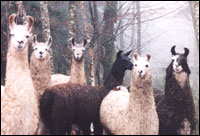
Hi, llamas.
Today, I am also working on a newsletter article called “Are you a bellybutton Christian?” On three separate occasions, I have heard tribal Christians describe themselves as bellybutton Christians. This reflects their sense of an umbilical-cord connection to Mother Earth that has provided them with food, shelter, clothing, and medicine for eons. They talk about the struggle to not lose their bellybuttons when they move out of a traditional subsistence relationship with nature. But many Christians I talk to feel that the phrase “Mother Earth” is somehow pantheistic or new age. This fear reflects the church’s foolish disconnection from the reality of our humanness.
This disconnection became apparent at a Christian Rock Festival where I was hosting a table. A young man came by and told me that, “Earth doesn’t matter, because we’re not animals.” I glibly responded, “Dude, you have nipples. You’re a mammal. If I covered your mouth with my hand, you would quickly discover your mammalian need for oxygen.” I don’t mind the environmental ignorance as much as the self-righteousness that seems to come with it.
Restoring Eden works hard to create an educated, connected, grassroots movement of Christians willing to speak out. Today I’ll spend some time on the phone working with the director of our new partnership, Chris Elisara of the Creation Care Study Program, which offers students the opportunity to spend a semester in either Belize or in New Zealand and Samoa. The students spend four months taking courses such as “God and Nature,” “Sustainable Community Development,” and “Literature of the Wild.” When the students return, they become the leaders of the campus chapters of Restoring Eden.

Restoring Eden has been able to take advantage of media coverage to broadcast its message of loving, serving, and protecting God’s creation to the general public. One reason Restoring Eden gets good media coverage is our strategy of bumper-sticker messaging. The goal is short, simple, to-the-point messages that are easily repeatable. The favorites are:
Your soul needs the wild.
If you love the Creator, take care of creation.
God’s original plan was to hang out in a garden with some naked vegetarians.
Extinction isn’t stewardship!
Too many groups, trying to become agents for social change, produce vast amounts of material that no one actually reads. Having solid information on your side isn’t enough. If a common-sense argument was sufficient, Ralph Nader would be president, hemp would be legal, recycling would be mandatory — and I’d be skinny! The failure to change is not simply about lack of information; it’s about lack of a heart connection. The goal is to reach a critical mass of advocates who then tip society toward sustainable behaviors. The church has a name for a community-wide paradigm shift: a revival.
I long for a revival of faithful, loving, and wise stewardship; of a celebration of the wonder and wisdom of creation. It’s time to get out our tambourines, set up a tent on the edge of town, and start singing.

